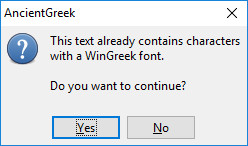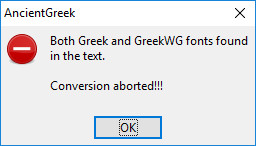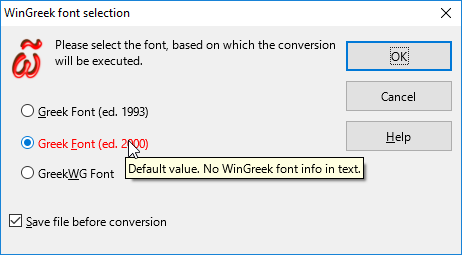Codifica WinGreek
WinGreek is "a system for using Greek and Hebrew fonts in Windows. It is comprised of a set of fonts and some utilities". The fonts provided are "Greek Regular" and "GreekWG Regular". Text written in WinGreek is called WinGreek Encoded.
"Greek Regular" comes in two editions; the original 1993 edition and the 2000 edition, which is somewhat different from its predecessor and codes more letters as well.
Since the WinGreek system is proprietary S/W, these fonts cannot be published here, but can easily be obtained form WinGreek site or the internet.
AncientGreek WinGreek conversion Le macro ^
Consiglio vivamente di effettuare un salvataggio del proprio lavoro prima di eseguire una qualsiasi di queste macro sull’intero documento (senza cioè specificare una selezione di testo), di modo che sia possibile ripristinare il suo stato precedente attraverso la voce di menu File / Ricarica; il comando Annulla potrebbe infatti non essere sufficientemente d’aiuto, dal momento che l’esecuzione di una macro impostata per effettuare delle sostituzioni lettera per lettera genera una sequenza troppo lunga di azioni successive da annullare.
Se una di queste macro viene eseguita senza aver prima selezionato una porzione di testo, apparirà un messaggio di avviso simile a quello mostrato nell’immagine seguente.

Un messaggio di avviso su Windows 8.1
WinGreek font detection ^
Since WinGreek conversion depends entirely on the font used (or will be used), AncientGreek implementation has to take it into account too. So, when a WinGreek conversion starts, the document (or selection) is parsed character by character and fonts found are encountered for. Possible results are to find:
- Greek font only
- This means that either a 1993 or a 2000 font edition based conversion can be performed. If the preferred font edition has already been set (WinGreek configuration), then it will be used. Otherwise, the font selection window will be displayed so that the user can choose the font to be used.
- GreekWG font only
- A GreekWG font based conversion will be performed.
- WinGreek and non-WinGreek font
- The user will be asked whether the conversion should continue or not, using the following dialog.

- If the answer is positive, the font selection dialog will be presented to the user. The font proposed will be:
- "Greek font (ed. 1993)", if the font found is "Greek" and the font's edition is set to 1993 (WinGreek configuration).
- "Greek font (ed. 2000)", if the font found is "Greek" and the font's edition is set to 2000 (WinGreek configuration).
- "Greek font (ed. 2000)", if the font found is "Greek" and the font's edition is not set (WinGreek configuration).
- "GreekWG font", if the font found is "GreekWG".
- Both Greek and GreekWG fonts
- AncientGreek will not perform any conversion in this case. It will just display the following message and stop.

- No WinGreek fonts
- AncientGreek will display the font selection dialog so that the user can choose the font to be used.
The WinGreek font detection dialog ^

The font selection dialog on Windows 10
The "font selection dialog" will be displayed:
- When the WinGreek configuration option "Font selection always permitted" is set (checked).
- When the the WinGreek configuration has not been performed.
- This means that AncientGreek does not know what kind of conversion to execute (actually what font the conversion will be based on).
- When both WinGreek and non-WinGreek characters are found in the text.
Suggested font
The "font selection dialog" will always suggest a font to use for the conversion. The color of the suggested font will be:
Blue: A default value is suggested. This may mean that the WinGreek configuration has not been performed.
Red: The font suggested has been found in the text in question (document or selection). If non-WinGreek font(s) exist also, the conversion may result in a corrupt output.
If AncientGreek suggests a font which might lead to corrupt conversion results, or a default arbitrary font is suggested, and the "Salva il file prima della conversione" general option has not been set, the dialog will include and enable this option, as shown in the image above.
Defaults indication
If the WinGreek configuration has already been performed, default fonts will be indicated as follows:
- Greek font selection will be in bold characters.
- WinGreek font selection will be in underlined characters.
WinGreek Le macro ^
• WinGreekToUnicode Macro
This macro converts text written in WinGreek to Unicode (normal text that can be edited in LibreOffice / OpenOffice).
• UnicodeToWinGreek Macro
This macro converts text written in Unicode (normal text edited in LibreOffice / OpenOffice) to WinGreek.
Several characters will be converted to fullwidth/halfwidth characters before starting the actual conversion to WinGreek. These characters include "$", "#", "%", "«", "»" etc. which are used by WinGreek to represent Ancient Greek letters. These characters will be converted to their original value when converting back to Unicode.
The following table shows the characters substitution that takes place when converting Unicode text to WinGreek. All substitute characters are fullwidth/halhwidth characters, unless otherwise noted.
| Original character | Substitute character | Original character | Substitute character | |
|---|---|---|---|---|
| Trattino (– U+2013) | - (U+FF0D) | Hash Sign (# U+0023) | # (U+FF03) | |
| Tratto medio (— U+2014) | ― (U+2015) * | Dollar Sign ($ U+0024) | $ (U+FF04) | |
| Quotation Mark (" U+0022) | " (U+FF02) | Segno di percentuale (% U+0025) | % (U+FF05) | |
| Left Single Quotation Mark (‘ U+2018) | ʻ (U+02BB) * | Ampersand (& U+0026) | & (U+FF06) | |
| Apostrofo (Right Single Quotation Mark) (’ U+2019) | ʼ (U+02BC) * | Due punti (: U+003A) | : (U+FF1A) | |
| Left Low Single Quotation Mark (‚ U+201A) | ❟ (U+275F) * | Commercial At (@ U+0040) | @ (U+FF20) | |
| Right High Double Quotation Mark (“ U+201C) | 〝 (U+301D) * | Simbolo di centesimo (¢ U+00A2) | ¢ (U+FFE0) | |
| Right Double Quotation Mark (” U+201D) | ″ (U+2033) * | Simbolo di sterlina (£ U+00A3) | £ (U+FFE1) | |
| Left Low Double Quotation Mark („ U+201E) | 〟 (U+301F) * | Barra verticale interrotta (¦ U+00A6) | ¦ (U+FFE4) | |
| Left Double Angle Bracket (« U+00AB) | 《 (U+300A) * | Slash (/ U+002F) | / (U+FF0F) | |
| Right Double Angle Bracket (» U+00BB) | 》 (U+300B) * | Backslash (\ U+005C) | \ (U+FF3C) | |
| Exclamation Mark (! U+0021) | ! (U+FF01) | Punto elenco (• U+2022) | ・ (U+FF65) | |
| Plus Sign (+ U+002B) | + (U+FF0B) | Accento circonflesso Accent (^ U+005E) | ^ (U+FF3E) | |
| Plus-Minus Sign (± U+00B1) | +/- (U+FF0B U+FF0F U+FF0D) |
* Caratteri non a larghezza piena o a mezza larghezza.
Furthermore, several characters are missing from Codifica WinGreek altogether, so they have to be converted to "equivalent" characters before the actual conversion to WinGreek is performed. These characters are shown in the following table:
| Missing character | Substitute character | Missing character | Substitute character | |
|---|---|---|---|---|
| ᾂ (U+1F82) | ἂ (U+1F02) | Ῠ (U+1FE8) | Υ (U+03A5) | |
| Ᾰ (U+1FB8) | Α (U+0391) | Ῡ (U+1FE9) | Υ (U+03A5) | |
| Ᾱ (U+1FB9) | Α (U+0391) | ῠ (U+1FE0) | υ (U+03C5) | |
| ᾰ (U+1FB0) | α (U+03B1) | ῡ (U+1FE1)* | υ (U+03C5) | |
| ᾱ (U+1FB1)* | α (U+03B1) | Ϊ (U+03AA) | Ι (U+0399) | |
| ῐ (U+1FD0) | ι (U+03B9) | Ϋ (U+03AB) | Υ (U+03A5) | |
| ῑ (U+1FD1)* | ι (U+03B9) | ῗ (U+1FD7) | ϊ (U+03CA) | |
| Ῐ (U+1FD8) | Ι (U+0399) | ῧ (U+1FE7) | ϋ (U+03CD) | |
| Ῑ (U+1FD9) | Ι (U+0399) |
* Valid for Greek ed. 1993 only.
Duplicate characters ^
Greek ed. 2000 contains several duplicate characters, shown in the following table:
| Unicode character | First form | Second form | Unicode character | First form | Second form | |
|---|---|---|---|---|---|---|
| έ (U+03AD) | U+009A | U+0161 | ὶ (U+1F76) | U+0088 | U+02C6 | |
| ἐ (U+1F10) | U+0099 | U+2122 | ἲ (U+1F32) | U+008A | U+0160 | |
| ἑ (U+1F11) | U+0098 | U+02DC | ἳ (U+1F33) | U+0089 | U+2030 | |
| ἒ (U+1F12) | U+009F | U+0178 | ἴ (U+1F34) | U+0087 | U+2021 | |
| ἓ (U+1F13) | U+009E | U+017E | ἵ (U+1F35) | U+0086 | U+2020 | |
| ἔ (U+1F14) | U+009C | U+0153 | ἷ (U+1F37) | U+008C | U+0152 | |
| ἕ (U+1F15) | U+009B | U+203A | ῖ (U+1FD6) | U+008B | U+2039 | |
| ί (U+03AF) | U+0085 | U+2026 | ῟ (U+1FDF) | U+0091 | U+2018 | |
| ϊ (U+03CA) | U+017D | U+008E | ῏ (U+1FCF) | U+0092 | U+2019 | |
| ΐ (U+0390) | U+010C | U+008F | ῞ (U+1FDE) | U+0093 | U+201C | |
| ῒ (U+1FD2) | U+010D | U+0090 | ῎ (U+1FCE) | U+0094 | U+201D | |
| ἰ (U+1F30) | U+0084 | U+201E | ῝ (U+1FDD) | U+0095 | U+2022 | |
| ἱ (U+1F31) | U+0083 | U+0192 | ῍ (U+1FCD) | U+0096 | U+2013 |
AncientGreek will correctly convert these characters to Unicode, but will use only the "Second form" set when concerting text to WinGreek.
Utilizzare i caratteri a larghezza piena ^
If the document (or selection) contains ASCII characters (English text), they will automatically be converted to the "fullwidth / halfwidth" characters, when text conversion from Unicode to WinGreek is performed.
WinGreek implementation ^
AncientGreek supporta la codifica Ismini in maniera completa, come mostra la tabella seguente.
Avviso: ASCII control characters are displayed using the terms defined at The Unicode Consortium Specification v. 7, (in bold green color) followed by their Unicode code.
The following indications mean:
*Greek font ed. 2000 duplicate character
1valid for Greek font ed. 1993 only
2valid for Greek font ed. 2000 only
3valid for GreekWG font only
| Lettera greca | ASCII character (Lowercase) | ASCII character (Uppercase) | Lettera greca | ASCII character (Lowercase) | ASCII character (Uppercase) |
|---|---|---|---|---|---|
| Alpha | a | A | Nu | n | N |
| Beta | b | B | Xi | x | X |
| Gamma | g | G | Omicron | o | O |
| Delta | d | D | Pi | p | P |
| Epsilon | e | E | Rho | r | R |
| Zeta | z | Z | Sigma | s | S |
| Eta | h | H | Tau | t | T |
| Theta | q | Q | Upsilon | u | U |
| Iota | i | I | Phi | f | F |
| Kappa | k | K | Chi | c | C |
| Lambda | l | L | Psi | y | Y |
| Mu | m | M | Omega | w | W |
| Sampi | " (U+0022) | Digamma | # | ||
| Sigma finale | j | Stigma | $ | & | |
| Rho with Rough Breathing | ∙ (U+2019)1 · (U+00B7)2 |
Rho with Smooth Breathing | ¸ (U+00B8) | ||
| Archaic Koppa | % | South West Arrow (↙) | ! | ||
| Segni diacritici isolati | |||||
| Simbolo | ASCII Tipo di carattere | Simbolo | ASCII Tipo di carattere | Simbolo | ASCII Tipo di carattere |
| Spirito dolce | ' | Spirito aspro | ` | Iota sottoscritto | Ä |
| Accento acuto | / | Accento grave | \ | Accento circonflesso | ^ |
| Spirito dolce with Accento acuto* | ” | Spirito dolce with Accento grave* | – | Spirito dolce with Accento circonflesso* | ’ |
| Spirito aspro with Accento acuto* | “ | Spirito aspro with Accento grave* | • | Spirito aspro with Accento circonflesso* | ‘ |
| Dieresi with acute | —1 EPA (U+0097)2 |
Dieresi with grave | NBSP (U+00A0) | Iota sottoscritto | Ä |
| Segno di lunga | XXX (U+0080)2 | ||||
| Vocali greche minuscole con segni diacritici | |||||
| Simbolo | ASCII Tipo di carattere | Simbolo | ASCII Tipo di carattere | Simbolo | ASCII Tipo di carattere |
| Alpha con spirito dolce | ¢ | Alpha con spirito aspro | ¡ | Alpha con iota sottoscritto | & |
| Alpha con accento acuto | £ | Alpha con accento grave | ¦ | Alpha con accento circonflesso | © |
| Alpha con accento acuto e iota sottoscritto | ® | Alpha con accento grave e iota sottoscritto | ± | Alpha con accento circonflesso e iota sottoscritto | ´ |
| Alpha con spirito dolce e accento acuto | ¥ | Alpha con spirito dolce e accento grave | ¨ | Alpha con spirito dolce e accento circonflesso | « |
| Alpha con spirito aspro e accento acuto | ¤ | Alpha con spirito aspro e accento grave | § | Alpha con spirito aspro e accento circonflesso | ª |
| Alpha con spirito dolce e iota sottoscritto | −1 SHY (U+00AD)23 |
Alpha con spirito aspro e iota sottoscritto | ¬ | Alpha with macron | BPH (U+0082)2 |
| Alpha con spirito dolce, accento acuto e iota sottoscritto | ° | Alpha con spirito dolce, accento grave e iota sottoscritto | ³ | Alpha con spirito dolce, accento circonflesso e iota sottoscritto | ¶ |
| Alpha con spirito aspro, accento acuto e iota sottoscritto | ¯ | Alpha con spirito aspro, accento grave e iota sottoscritto | ² | Alpha con spirito aspro, accento circonflesso e iota sottoscritto | µ |
| Epsilon con spirito dolce* | ™ | Epsilon con spirito aspro* | ˜ | ||
| Epsilon con accento acuto* | š | Epsilon con accento grave | OSC (U+009D) | Epsilon with circumflex | ü |
| Epsilon con spirito dolce e accento acuto* | œ | Epsilon con spirito dolce e accento grave* | Ÿ | ||
| Epsilon con spirito aspro e accento acuto* | › | Epsilon con spirito aspro e accento grave* | ž | ||
| Eta con spirito dolce | ¸ | Eta con spirito aspro | ¹ | Eta con iota sottoscritto | Ä |
| Eta con accento acuto | » | Eta con accento grave | ¾ | Eta con accento circonflesso | Á |
| Eta con accento acuto e iota sottoscritto | Ç | Eta con accento grave e iota sottoscritto | Ê | Eta con accento circonflesso e iota sottoscritto | Í |
| Eta con spirito dolce e accento acuto | Û | Eta con spirito dolce e accento grave | À | Eta con spirito dolce e accento circonflesso | Ã |
| Eta con spirito aspro e accento acuto | ¼ | Eta con spirito aspro e accento grave | ¿ | Eta con spirito aspro e accento circonflesso | Â |
| Eta con spirito dolce e iota sottoscritto | Æ | Eta con spirito aspro e iota sottoscritto | Å | ||
| Eta con spirito dolce, accento acuto e iota sottoscritto | É | Eta con spirito dolce, accento grave e iota sottoscritto | Ì | Eta con spirito dolce, accento circonflesso e iota sottoscritto | Ï |
| Eta con spirito aspro, accento acuto e iota sottoscritto | È | Eta con spirito aspro, accento grave e iota sottoscritto | Ë | Eta con spirito aspro, accento circonflesso e iota sottoscritto | Î |
| Iota con spirito dolce* | „ | Iota con spirito aspro* | ƒ | Iota with macron | þ23 |
| Iota con accento acuto* | … | Iota con accento grave* | ˆ | Iota con accento circonflesso* | ‹ |
| Iota con spirito dolce e accento acuto* | &Obelisco; | Iota con spirito dolce e accento grave* | Š | Iota con spirito dolce e accento circonflesso* | RI (U+008D) |
| Iota con spirito aspro e accento acuto* | † | Iota con spirito aspro e accento grave* | ‰ | Iota con spirito aspro e accento circonflesso* | Œ |
| Iota con dieresi e accento acuto* | SS3 (U+008F) | Iota con dieresi e accento grave* | DCS (U+0090) | Iota con dieresi* | SS2 (U+008E) |
| Omicron con spirito dolce | Ñ | Omicron con spirito aspro | Ð | ||
| Omicron con accento acuto | Ò | Omicron con accento grave | Õ | Omicron with circumflex | ý |
| Omicron con spirito dolce e accento acuto | Ô | Omicron con spirito dolce e accento grave | × | ||
| Omicron con spirito aspro e accento acuto | Ó | Omicron con spirito aspro e accento grave | Ö | ||
| Upsilon con spirito dolce | Ù | Upsilon con spirito aspro | Ø | Upsilon with macron | ÿ23 |
| Upsilon con accento acuto | Ú | Upsilon con accento grave | Ý | Upsilon con accento circonflesso | à |
| Upsilon con spirito dolce e accento acuto | Ü | Upsilon con spirito dolce e accento grave | ß | Upsilon con spirito dolce e accento circonflesso | â |
| Upsilon con spirito aspro e accento acuto | Û | Upsilon con spirito aspro e accento grave | Þ | Upsilon con spirito aspro e accento circonflesso | á |
| Upsilon con dieresi e accento acuto | ä | Upsilon con dieresi e accento grave | å | Upsilon con dieresi | ã |
| Omega con spirito dolce | ç | Omega con spirito aspro | æ | Omega con iota sottoscritto | J |
| Omega con accento acuto | è | Omega con accento grave | ë | Omega con accento circonflesso | î |
| Omega con accento acuto e iota sottoscritto | ó | Omega con accento grave e iota sottoscritto | ö | Omega con accento circonflesso e iota sottoscritto | ù |
| Omega con spirito dolce e accento acuto | ê | Omega con spirito dolce e accento grave | í | Omega con spirito dolce e accento circonflesso | ð |
| Omega con spirito aspro e accento acuto | é | Omega con spirito aspro e accento grave | ì | Omega con spirito aspro e accento circonflesso | ï |
| Omega con spirito dolce e iota sottoscritto | ò | Omega con spirito aspro e iota sottoscritto | ñ | ||
| Omega con spirito dolce, accento acuto e iota sottoscritto | õ | Omega con spirito dolce, accento grave e iota sottoscritto | ø | Omega con spirito dolce, accento circonflesso e iota sottoscritto | û |
| Omega con spirito aspro, accento acuto e iota sottoscritto | ô | Omega con spirito aspro, accento grave e iota sottoscritto | ÷ | Omega con spirito aspro, accento circonflesso e iota sottoscritto | ú |
Segni diacritici ^
- On uppercase letters these are keyed in the order:
- (1) breathing, (2) letter
- (1) accent, (2) letter
- (1) breathing & accent, (2) letter
- Iota sottoscritto is inserted using an i (U+0069) character following any of the previous combinations
